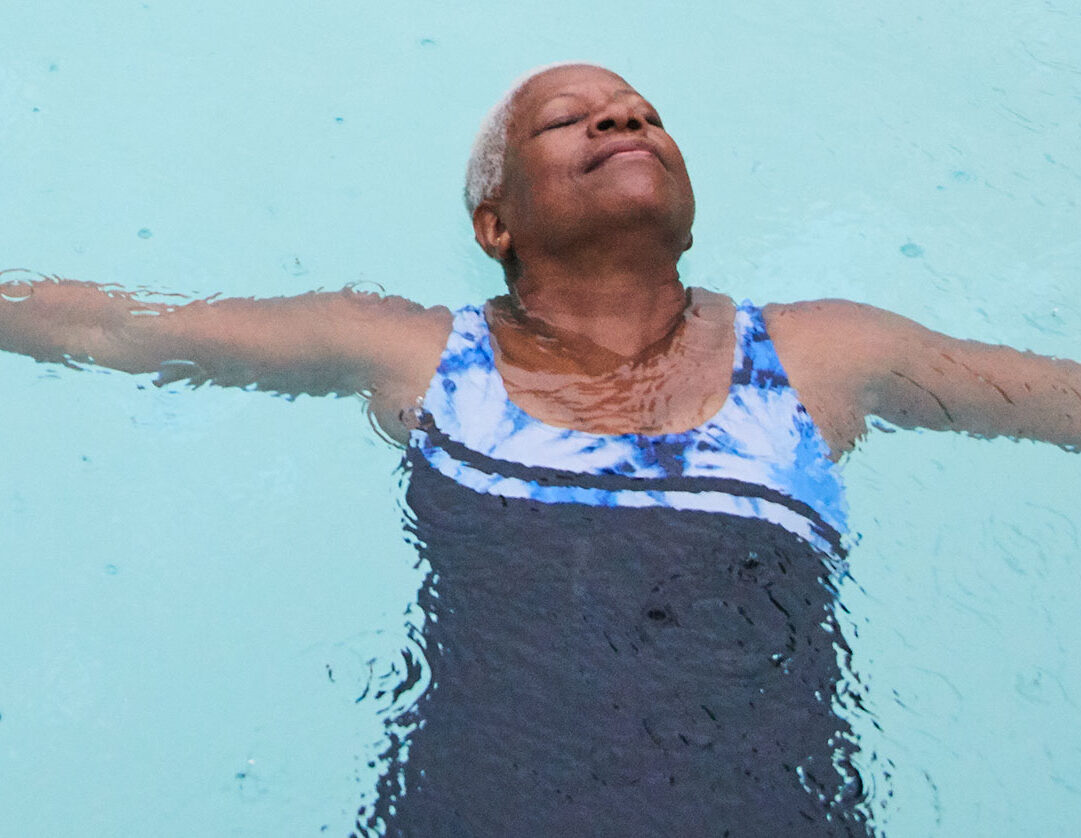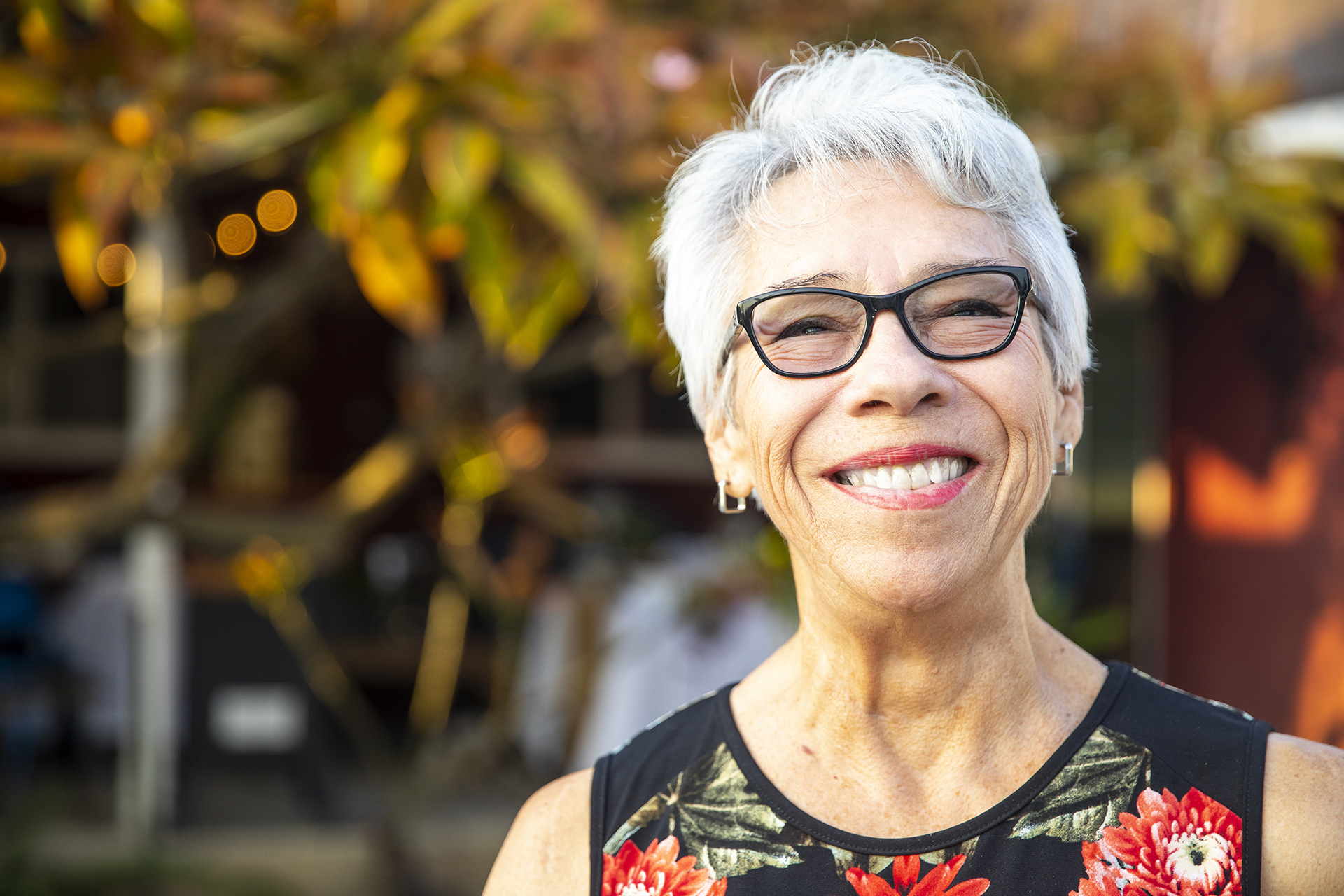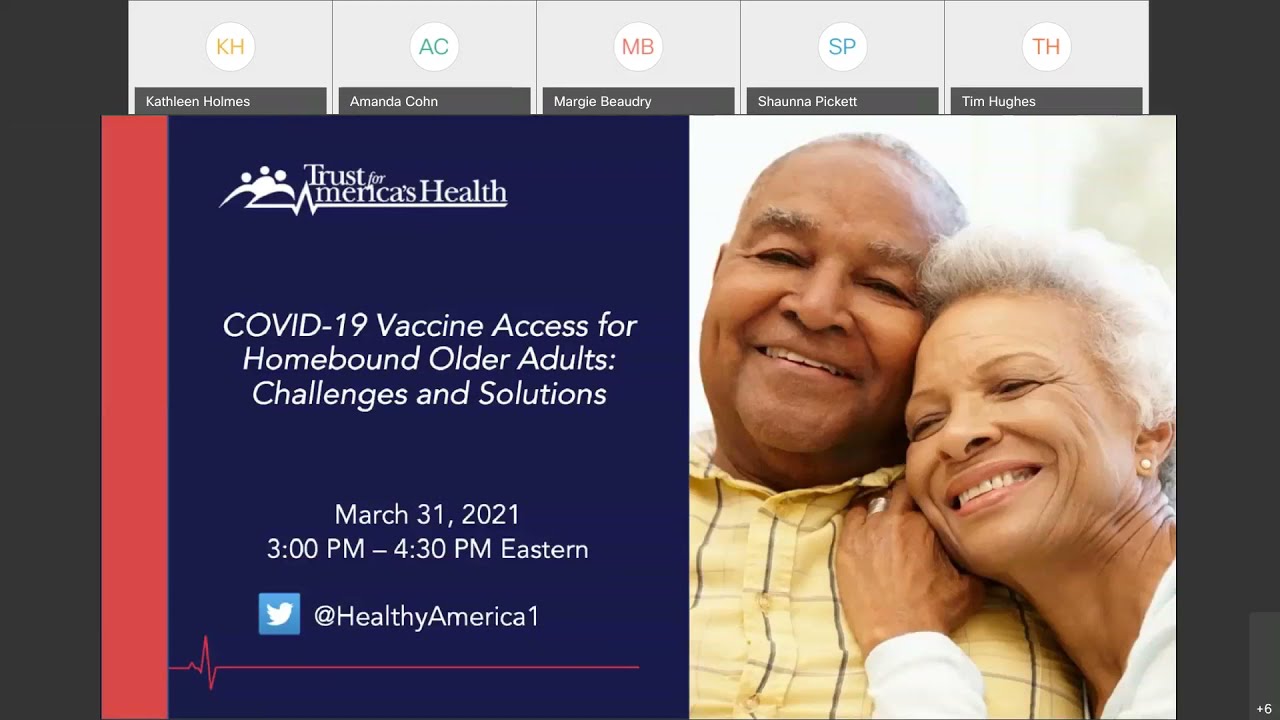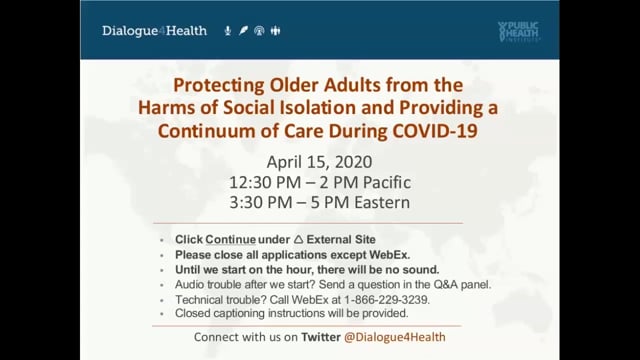Issue Category: Age-Friendly Public Health
Age-Friendly Public Health
Older adults are the fastest growing demographic of the U.S. population. This year, 10,000 Americans will reach age 65 on a daily basis.
Public Health departments and systems can make important contributions to the health and productivity of older Americans. Trust for America’s Health and The John A. Hartford Foundation are partnering with state and local health departments to help them implement a public health framework within their department activities to support the health and well-being of their older adult residents. Learn more about the initiative at Age-Friendly Public Health Systems – Trust for America’s Health.
Healthy aging initiatives should involve multiple sectors of a community and should implement evidence-based programs to reduce social isolation and risk factors for illness and injury among the older adult population.
New Report: U.S. Must Prioritize COVID-19 Vaccines for People Who Are Homebound
Experts provide strategies to ensure equitable vaccine distribution for homebound people
(Washington, DC – May 3, 2021) – At least 2 million older adults are homebound a number that increases when including younger people who are homebound due to illness or disability. Ensuring that this population group receives the COVID-19 vaccination requires focused attention, collaboration and resources according to a policy brief released today by Trust for America’s Health (TFAH).
The brief, Ensuring Access to COVID-19 Vaccines for Older Adults and People with Disabilities Who are Homebound, recommends actions that federal, state, and local government, state and local health agencies, the healthcare sector and community partners should take to ensure that people who are homebound are vaccinated.
According to the report, all parties involved in the COVID-19 vaccination effort have a responsibility to ensure people who are homebound are vaccinated, which means redirecting or creating the infrastructure, workforce, and funding support to bring the vaccination process to them. Adding to the importance of equity in vaccine access is the fact that people who are homebound often have underlying health conditions that put them at heighten risk if they were infected by the COVID-19 virus. In addition, the processes created or improved to meet the challenge of this pandemic will strengthen the nation’s public health infrastructure for the growing segment of the population who are homebound and help better safeguard their health during future public health emergencies.
“Ensuring that every person is vaccinated against the COVID-19 virus is not only a matter of health equity, its critical to ending the pandemic, said John Auerbach, President and CEO of TFAH. “But millions of people in the U.S. cannot travel to a vaccination site. Government and community partners must work together to protect the health of the homebound population by bringing the vaccine to them.”
Among the report’s recommendations are:
- Prioritize the administration of COVID-19 vaccination for people who are homebound and their caregivers (both paid and unpaid) by providing sufficient vaccines and the resources needed to administer them in the shortest time possible.
- Develop a standardized operational definition of “people who are homebound” in order to identify this population and prioritize their vaccination.
- Ensure that the COVID-19 vaccine is equitably available across the homebound population and that no subset of the population is less served due to race, ethnicity, SES status or where they live. Use data to identify pockets of under-vaccination.
- Develop and actively promote multiple communications channels for vaccine appointments scheduling, including use of channels that minimize reliance on computers and internet access.
- Leverage partnerships and establish new ones with public and private sector organizations that already serve the homebound population to ensure equitable and efficient vaccine administration.
- Ensure, to the degree possible, that in-home vaccination teams include people who are trusted by those being vaccinated and who represent the diversity of the population they serve.
- Government agencies and private payors should ensure that all costs associated with in-home vaccinations are covered including administrative expenses, travel time and transportation costs, and observation time.
The report is an outgrowth of two national expert convenings hosted by Trust for America’s Health. Funding for the report and convenings was provided by The John A. Hartford Foundation and the Cambia Health Foundation.
“Older adults and those with disabilities who are homebound have been the forgotten faces of this pandemic,” said Terry Fulmer, PhD, RN, FAAN, President of The John A. Hartford Foundation. “We now know about cutting-edge solutions, as well as failed strategies we can learn from, to ensure that everyone has equitable access to vaccinations going forward.”
“We are committed to ensuring equitable vaccine access for all, including homebound older adults and people with disabilities who may face obstacles scheduling online appointments or getting to vaccination sites,” said Peggy Maguire, President, Cambia Health Foundation. “We funded the Trust for America’s Health national grant with thought leaders from other parts of the country so that we could share learnings and best practices that will help homebound people and their caregivers in our four states access the COVID-19 vaccine and achieve health equity.
Ensuring Access to COVID-19 Vaccines for Older Adults and People with Disabilities Who are Homebound
New Website Helps Local Health Departments Support Older Adults
Washington, DC (April 28, 2021) – Trust for America’s Health (TFAH), with funding from The John A. Hartford Foundation, has developed and launched the Age-Friendly Public Health Systems Initiative (AFPHS) online resource portal.
Older adults are the fastest growing demographic of the U.S. population. Every day more than 10,000 people reach age 65. The new AFPHS.org site is designed to be a hub resource of the many programs, recommendations, guidelines, and tool kits the AFPHS initiative and network partners have developed to help state and local public health departments make healthy aging a core component of their operations.
Healthy aging related content on the site includes information on ageism, the age-friendly ecosystem, caregiving, COVID-19, physical and mental health, the social determinants of health, health equity and partnership and collaborations, as well as future events and past recordings of AFPHS training sessions.
The site also houses the Age-Friendly Public Health Systems Recognition Program, in which state and local health departments are invited to enroll. Health departments that enroll will receive guidance and technical assistance from TFAH to complete action in 10 areas considered foundational to becoming age friendly.
Practitioners in public health, aging and disability services, and healthcare organizations will find useful resources on the site as well as a community of like-minded professionals and a place to exchange resources, ideas, and questions. State and Local health departments are invited to learn more about the AFPHS network that currently includes Florida, Michigan, Mississippi, and Washington State. Interested individuals can sign-up for the AFPHS newsletter on the site.
COVID-19 Vaccine for Homebound Older Adults: Challenges and Solutions
There are up to 15 million older adults and people with disabilities in America that are experiencing challenges accessing the COVID-19 vaccine due to issues that prevent them from traveling to a vaccine site. With support from The John A. Hartford Foundation and the Cambia Health Foundation, Trust for America’s Health is offering a webinar to explore the challenges and policy barriers to vaccine access and highlight innovative vaccine distribution practices. The complexities of vaccine distribution to homebound individuals was discussed, as well as the crucial partnerships among public health departments, aging services and other community stakeholders that are key to expanding vaccine access.
The Age-Friendly Public Health Systems 5Cs Framework in Action: Florida Summary Report
Protecting Older Adults from the Harms of Social Isolation and Providing a Continuum of Care During COVID19
The ongoing COVID-19 crisis presents unique challenges for the public health and aging sectors. While social distancing protects older adults who are at higher risk for complications from the virus, the practice can exacerbate social isolation, a longstanding issue for this population. The needs of older adults must be considered across a continuum of care from primary prevention to post-acute care in the coming months.




